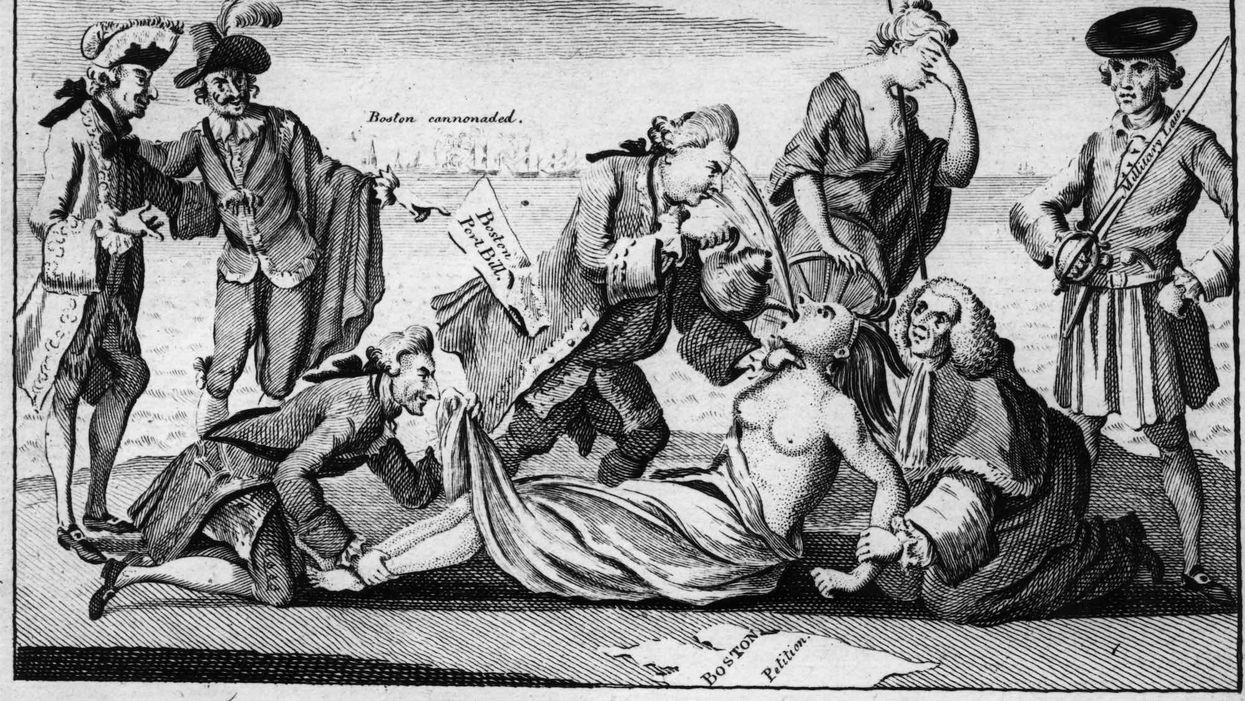Editor's note: In order to allow our staff to enjoy the 4th of July holiday with their families, TheBlaze will be running a series of articles today commemorating the Revolutionary War, which won America her freedom. God bless America, and all of you.
LONDON (1774) — In response to the activities of Dec. 16, 1773, the British Parliament has passed a series of punitive acts to be revoked only upon the compensation of the East India Company for goods that were allegedly irreparably damaged by American colonists.
The harsh legislation began after a group calling themselves the Sons of Liberty deposited nearly 350 crates of tea into Boston Harbor to protest the Tea Act. The legislation closed the port of Boston, appointed a new military government under Gen. Thomas Gage, and rendered British soldiers immune from prosecution for criminal violations.
In keeping with the Boston Port Act, the British Navy plans to establish a blockade of Massachusetts Bay until the town's unruly residents agree to pay for the tea that was dumped into Boston Harbor in protest. The Massachusetts Government Act has likewise established martial law and curbed the rights of rebellious colonists to gather into groups.
The so-called Administration of Justice Act, passed on May 20, was the final blow in a succession of punishments meted out to the province of Massachusetts, which has been the focal point of American hostility toward the mother country. It renewed the ability British troops exercised under the expired Quartering Act to take residence in unoccupied buildings at the will of the colonial governor.
Parliament continues debate on the Quebec Act, which would allow the French of that region to be governed by the Roman Catholic church and extend its territory into colonial western claims. Under this act, colonists in Boston and the Massachusetts Bay area would not be permitted to govern themselves, and would be cut off from their own independent trade by the British Navy, forcing them to rely on surrounding colonies for food and supplies.
The Quebec Act would punish the citizens of Massachusetts by allowing the French of Quebec to be subject to their own civil laws while Massachusetts would remain under the firm grip of the British Parliament.
Meanwhile, Boston merchants will soon be unable to trade goods because the British will occupy the harbor. Parliament still expects the East India Company to be repaid in full.
A small minority in Parliament, led by Edmund Burke, has begun to speak out against Parliament's treatment of the colonies. In a recent speech, Burke claimed that these Coercive Acts would make British rule intolerable to the American colonies, and might lead to future military conflict and war.
Burke warned that colonists outside of Massachusetts might sympathize with their plight and would likewise fear that Britain would soon intend to meddle in their affairs in a similar manner. Burke offered an impassioned speech in Parliament in favor of a motion to repeal the Tea Tax outright, but the motion was easily defeated in spite of Burke's protests.
It has been suggested in a variety of writings that an inter-colonial conference of some kind be convened to discuss the implications of Parliament's actions for all of the American colonies. One may take place as early as this autumn, though some colonies as yet remain mostly uninterested.
(Sources:
History.com, Encyclopedia Britannica, U.S. History Scene)







